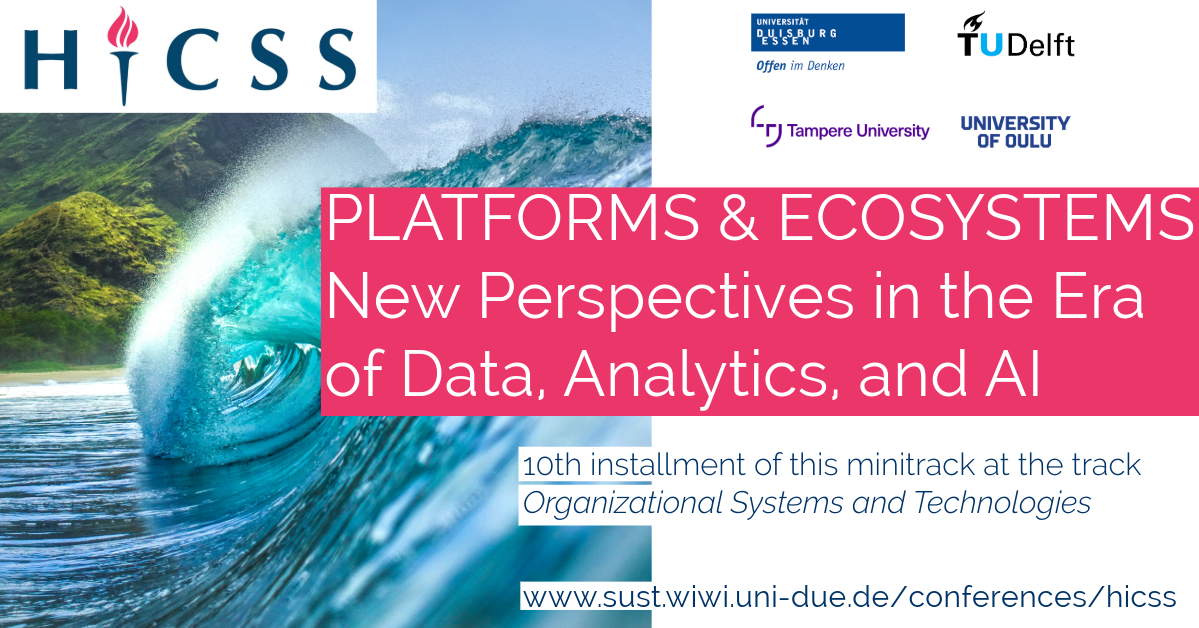PLATFORMS & ECOSYSTEMS: New Perspectives in the Era of Data, Analytics, and AI (HICSS minitrack)

We are delighted to invite papers and participation to our HICSS-58 minitrack on ‘Platforms & Ecosystems: New Perspectives in the Era of Data, Analytics, and AI’. The minitrack marks the tenth installation of successful exploration of platforms and ecosystems since HICSS-49 (see Russell et al. 2021).
Understanding modern-day competition and the survival of organizations oftentimes requires an ecosystem lens. This is because digital technologies have enabled new complementarities between actors within and across industries (e.g., Cusumano et al. 2019). The increasing platformization of firms and technologies has important implications in how companies create and capture value. In this new “digital first” economy (Baskerville et al. 2020), transaction and innovation platforms have become dominant forms of organization (Gawer 2021, de Reuver et al. 2018, van Dijck 2018). As scholars interested in platforms and ecosystems, we…
(1) face new phenomena,
providing insights from (2) new empirics,
that might (3) require new methods,
and (4) new theories.
In the following, we provide exemplary provocations for research at the intersections of platforms and ecosystems that provide first glances into the research of interest to this minitrack. In general, however, the minitrack seeks contributions that problematize or build on diverse theoretical backgrounds such as management science, information systems, computer science, decision science, system science, organizational design, policy making, complexity, and behavioral economics to continue the scholarly exploration of concepts, theories, models, and tools for managing platforms and ecosystems.
Platforms & Ecosystems + Data, Analytics, and AI:
In the past decade(s), platform research has introduced important mechanisms for explaining platform emergence and growth such as network externalities (e.g., Eisenmann et al. 2011; Karhu and Ritala, 2021), generativity (e.g., Furstenau et al., 2023), or legitimization (Taeuscher and Rothe, 2021). Beyond traditional views on the growth of users, complementors, and firm size, platform providers collect more and more data (Aaltonen et al. 2020) that can be used for producing superior machine learning and AI applications. At the same time, ML and AI applications produce new data to provide growth of platforms (Gregory et al. 2021). Large language model platforms such as (Chat)GPT indicate a shift from producing value through matching complementors and users to learning how to produce content and services from data over time. Decentralized infrastructures such as “Web 3.0” might challenge current forms of organizing ecosystems via platforms, because data and rights to use data are shared under new terms.
Platforms & Ecosystems + Global Grand Challenges:
As we reached the halftime mark of UN Agenda 2030, demand and supply sides are increasingly concerned about their impact on the 17 sustainable development goals. None of these challenges can be solved by single actors (Waddock et al., 2015). Instead, they involve many actors, across organizations, and beyond the reach of regular organizational control (Kokshagina, 2022). Thus, platform ecosystems are considered tools to address grand challenges (Ritala, 2023) and societal challenges (Addo, 2022). At this point, however, platform theorizing is mostly concerned with mechanisms explaining economic growth and development rather than digital sustainability, responsibility, or circular economies in ecosystems. This is surprising, considering the also increasing availability of broad ecosystem datasets that complement measurements of societal, ecological, and economic impact of market offerings.
Platforms & Ecosystems + Innovation, Policy, and Purpose
Platforms and ecosystems promise accessibility and democratization of value creation and capture by inverting the firm (Parker et al. 2017) or producing new labor markets in a sharing economy (Nian et al. 2021). We have, however, learned that platform providers accumulate power, sometimes leading to the misuse of market dominance (Aral, 2021; Khan, 2019). This is important because platforms and ecosystems affect their environment. Recommendation systems of Instagram, for example, have been perceived as harmful for teenagers, eventually inducing testimonies of leading managers before the US Congress. Crowdfunding platforms have not torn down socio-economic barriers (Kim and Hann, 2019), and peer-to-peer lending platforms have affected decisions as personal as ones on abortion and women's health (Ozer et al. 2022).
Platforms & Ecosystems + New Methodological Approaches
We are eager to widen the set of methodological approaches, including empirical research, case-based research, field studies, design science, behavioral decision-making experiments, and conceptual research. At the same time, we acknowledge that with greater availability of usage, process, or environmental data, novel approaches towards computational research (Berente et al. 2019) might allow the creation of insights that are able to unravel micro mechanisms in platforms or shed light on the greater complexities of ecosystems. In addition, new ML capabilities suggest novel avenues for qualitative inquiries.
Join us in this inquiry. Bring your insights to our next and continuous discussions on platforms and ecosystems.
Bibliography
- Addo, A. (2022). Orchestrating a digital platform ecosystem to address societal challenges: A robust action perspective. Journal of Information Technology, 37(4), 359–386. doi.org/10.1177/02683962221088333
- Aral, S. (2021). The Hype Machine: How Social Media Disrupts Our Elections, Our Economy, and Our Health—And How We Must Adapt. Currency.
- Baskerville, R., Myers, M. D., & Yoo, Y. (2020). Digital First: The Ontological Reversal and New Challenges for IS Research. MIS Quarterly, 44(2), 509-523.
- Berente, N., Seidel, S., & Safadi, H. (2019). Research commentary—data-driven computationally intensive theory development. Information systems research, 30(1), 50-64.
- Cusumano, M. A., Gawer, A., & Yoffie, D. B. (2019). The business of platforms: Strategy in the age of digital competition, innovation, and power (pp. 1-309). New York: Harper Business.
- de Reuver, M., Sørensen, C., & Basole, R. C. (2018). The digital platform: a research agenda. Journal of Information Technology, 33(2), 124-135.
- Eisenmann, T., Parker, G., & Alstyne, M. V. (2011). Platform envelopment. Strategic Management Journal, 32(12), 1270–1285.
- Furstenau, D., Baiyere, A., Schewina, K., Schulte-Althoff, M., Rothe, H. (forthcoming). Extended Generativity Theory on Digital Platforms. Information Systems Research.
- Gawer, A. (2021). Digital platforms’ boundaries: The interplay of firm scope, platform sides, and digital interfaces. Long Range Planning, 54(5), 102045.
- Garud, R., Kumaraswamy, A., Roberts, A., & Xu, L. (2022). Liminal movement by digital platform‐based sharing economy ventures: The case of Uber Technologies. Strategic Management Journal, 43(3), 447-475.
- Gregory, R. W., Henfridsson, O., Kaganer, E., & Kyriakou, H. (2021). The role of artificial intelligence and data network effects for creating user value. Academy of management review, 46(3), 534-551.
- Karhu, K., & Ritala, P. (2021). Slicing the cake without baking it: Opportunistic platform entry strategies in digital markets. Long Range Planning, 54(5), 101988.
- Khan, L. M. (2019). The separation of platforms and commerce. Columbia Law Review, 119(4), 973-1098.
- Kim, K., & Hann, I. H. (2019). Crowdfunding and the democratization of access to capital—An illusion? Evidence from housing prices. Information Systems Research, 30(1), 276-290.
- Kokshagina, O. (2022). Open Covid‐19: Organizing an extreme crowdsourcing campaign to tackle grand challenges. R&D Management, 52(2), 206–219.
- Nian, T., Zhu, Y. A., & Gurbaxani, V. (2021). The Impact of the Sharing Economy on Household Bankruptcy. MIS Quarterly,, 45(3), 1213-1248.
- Parker, G., Van Alstyne, M., & Jiang, X. (2017). Platform Ecosystems. MIS Quarterly, 41(1), 255-266.
- Ozer, G. T., Greenwood, B. N., & Gopal, A. (2022). Digital multisided platforms and women’s health: An empirical analysis of peer-to-peer lending and abortion rates. Information Systems Research.
- Ritala, P. (2023). Grand challenges and platform ecosystems: Scaling solutions for wicked ecological and societal problems. Journal of Product Innovation Management, jpim.12682.
- Russell, M., Rothe, H., & Huhtamäki, J. (2021). Introduction to the Minitrack on Managing the Dynamics of Platforms and Ecosystems. In Proceedings of the 54th Hawaii International Conference on System Sciences (p. 6109).
- Taeuscher, K., & Rothe, H. (2021). Optimal distinctiveness in platform markets: Leveraging complementors as legitimacy buffers. Strategic Management Journal, 42(2), 435-461.
- Van Dijck, J., Poell, T., & De Waal, M. (2018). The platform society: Public values in a connective world. Oxford University Press.
- Waddock, S., Meszoely, G. M., Waddell, S., & Dentoni, D. (2015). The complexity of wicked problems in large scale change. Journal of Organizational Change, 28(6), 993–1012
Chairs
Hannes Rothe (primary contact)
University of Duisburg-Essen
hannes.rothe (at) icb.uni-due.de
Vladimir Sobota
TU Delft
V.C.M.Sobota (at) tudelft.nl
Jukka Huhtamäki
Tampere University
jukka.huhtamaki (at) tuni.fi
Kaisa Still
University of Oulu
kaisa.still (at) oulu.fi
Advisory Committee
Chair of the Committee:
Rahul C. Basole (Accenture AI, USA)
Members of the Committee:
Amrit Tiwana (University of Georgia, USA)
Annabelle Gawer (University of Surrey)
Brandon Barnett (Intel Corporation, USA)
Carmelo Cennamo (Copenhagen Business School, Denmark)
Carsten Sørensen (London School of Economics, UK)
Daniel Fürstenau (Copenhagen Business School, Denmark)
Geoff Parker (Dartmouth College, USA)
Hyunwoo Park (Seoul National University, Korea)
Jesus Delvalle (Bayer, Germany)
Jianxi Luo (City University of Hong Kong, China)
Jim Spohrer (IBM Corporation, USA)
Karl Täuscher (University of Manchester, UK)
Mark de Reuver (Delft University of Technology, Netherlands)
Marko Seppänen (Tampere University, Finland)
Martha Russell (Stanford University, USA)
Michael Cusumano (Massachusetts Institute of Technology, USA)
Michael Jacobides (London Business School, UK)
Neil Rubens (Transport and Telecommunication Institute, Latvia)
Ola Henfridsson (University of Miami, USA)
Paavo Ritala (LUT University, Finland)
Raul Chao (University of Virginia, USA)
Tero Ojanperä (Silo.AI, Finland)
Timo Ali-Vehmas

